UPDATE: I’ve added unofficial results for each race.
Iowa Democrats have more competitive state legislative primaries in 2022 than in a typical election cycle. That’s partly because quite a few House and Senate members are retiring, and partly because the redistricting plan adopted in 2021 created some legislative districts with no incumbents.
In most of the races discussed below, the winner of the primary is very likely to prevail in November. However, a few of the districts could be targeted by one or both parties in the general election.
All data on past election performance in these districts comes from the Iowa House and Senate maps Josh Hughes created in Dave’s Redistricting App. Fundraising numbers are taken from the Iowa Ethics and Campaign Disclosure Board’s database.
This post is not an exhaustive account of all contested Democratic primaries for state legislative offices. You can find the full primary candidate list here.
IOWA SENATE
I’m watching three open-seat races for Iowa Senate seats particularly closely.
Senate district 17
The new map created this district with no incumbent, covering part of the city of Des Moines in Polk County.

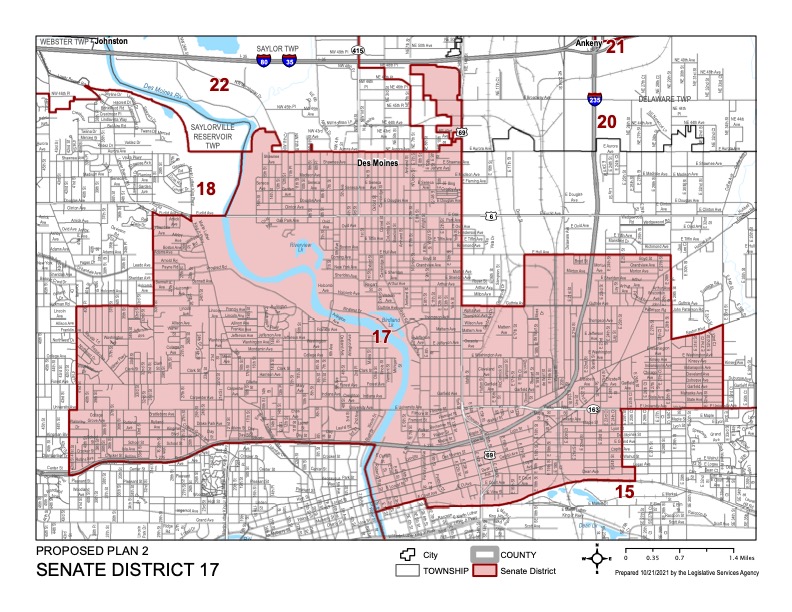
2020 voting for president: Joe Biden 70.3 percent, Donald Trump 27.2 percent
2020 voting for Senate: Theresa Greenfield 70.4 percent, Joni Ernst 25.5 percent
2018 voting for governor: Fred Hubbell 73.6 percent, Kim Reynolds 23.8 percent
Both Democratic candidates, Izaah Knox and Grace Van Cleave, have many high-profile supporters in Des Moines. Knox leads the nonprofit Urban Dreams, and Van Cleave owns a consulting business catering to professional women. The Des Moines Register asked both candidates about their priority issues and how they would approach the job: see here and here.
Although Knox and Van Cleave are first-time candidates, their fundraising exceeds that of many long-serving Iowa legislators. Knox has reported raising more than $56,000, and Van Cleave more than $106,000.
Both candidates could make the Iowa Senate more diverse. Van Cleave would increase the ranks of women senators and Knox would be the only person of color serving in the chamber. (Only one other Black Iowan has ever been elected to the state Senate, and his legislative career ended three decades ago.)
The winner of the primary will be heavily favored in November. Two other candidates have filed for the general election ballot: Libertarian ToyA Johnson and Alejandro Murguia-Ortiz, an independent running on a progressive/left platform. Republicans are not currently fielding a candidate here. Even if the GOP nominates someone after the primary, that candidate would have no chance in November.
UPDATE: Knox won with 2,726 votes (67.1 percent) to 1,336 votes (32.9 percent), according to unofficial returns.
Senate district 37
This district, covering part of Cedar Rapids and its suburbs in Linn County, is another open seat created through redistricting.
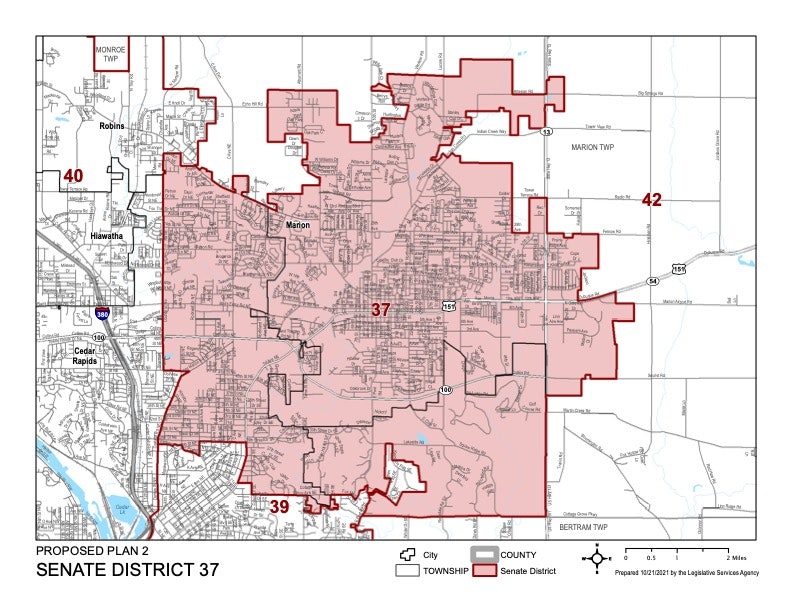
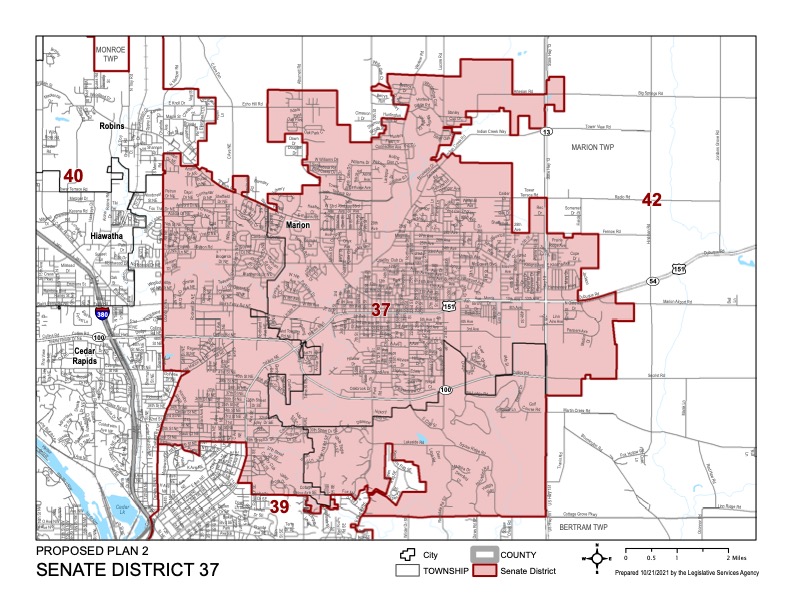
2020 voting for president: Joe Biden 55.4 percent, Donald Trump 42.0 percent
2020 voting for Senate: Theresa Greenfield 53.8 percent, Joni Ernst 43.1 percent
2018 voting for governor: Fred Hubbell 53.9 percent, Kim Reynolds 43.4 percent
State Representative Molly Donahue is a longtime teacher who was elected to the Iowa House in 2018 and 2020. Austin Frerick is deputy director of the Thurman Arnold Project at Yale University, which focuses on academic research related to competition policy and antitrust enforcement. (Disclosure: I consider Frerick a friend and attended his wedding last year.)
The Cedar Rapids Gazette interviewed both candidates about their stances on key issues. Both candidates grew up in the Cedar Rapids area and have many well-known local supporters. Groups backing Donahue include the Hawkeye Area Labor Council AFL-CIO, a Plumbers and Pipe Fitters local, Our Revolution Iowa, and the Iowa Unity Coalition. Groups backing Frerick include Teamsters and SEIU locals, One Iowa Action, Iowa CCI Action, and Democracy for America.
In her campaign messaging, Donahue has stressed her nearly lifelong residence in the Cedar Rapids metro and has questioned Frerick’s commitment to representing area residents.
Frerick has a big fundraising advantage, reporting about $95,000 in contributions since launching his campaign in January. Donahue has raised about $21,000 so far during the election cycle.
Both candidates could make the Iowa Senate better reflect the state’s population, Donahue by adding gender diversity, and Frerick by being part of the LGBTQ community. Democrat Matt McCoy, who retired from the legislature in 2018, was the first and so far the only out LGBTQ person to serve in the Iowa Senate.
No Republican has filed to run in Senate district 37 yet, but the GOP could nominate a candidate over the summer. The Democratic nominee would be favored in November, based on the area’s recent voting history.
UPDATE: Donahue won with 2,350 votes (51.6 percent) to 2,207 votes (48.4 percent), according to unofficial returns.
Senate district 39
This district, covering part of Cedar Rapids, is open because Democratic State Senator Rob Hogg opted not to seek re-election.
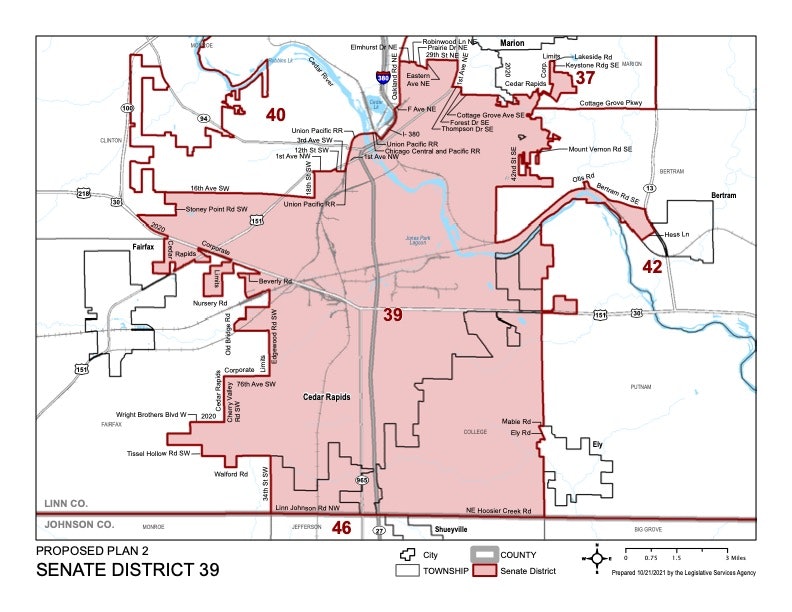
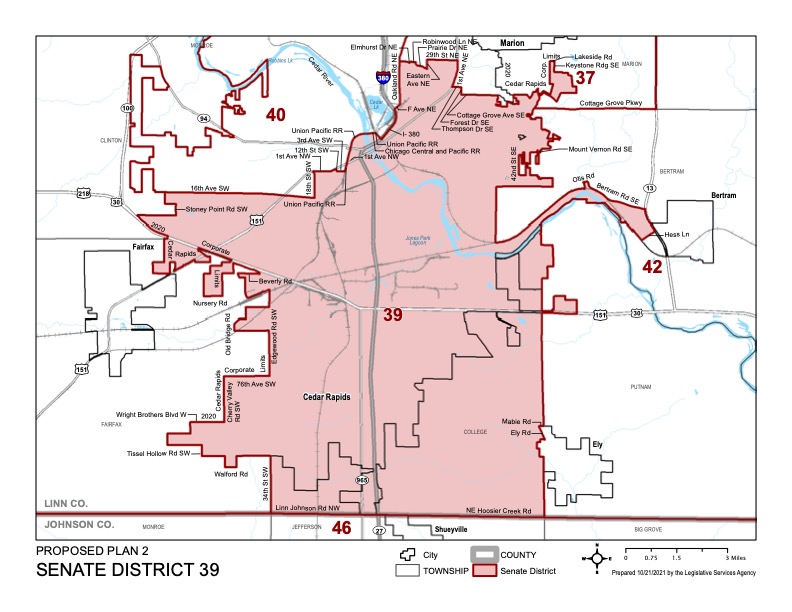
2020 voting for president: Joe Biden 63.1 percent, Donald Trump 34.3 percent
2020 voting for Senate: Theresa Greenfield 62.6 percent, Joni Ernst 33.6 percent
2018 voting for governor: Fred Hubbell 63.8 percent, Kim Reynolds 32.9 percent
State Representative Liz Bennett has served four terms in the Iowa House. Joe Zahorik is the political director for the Ironworkers Local 89.
The Cedar Rapids Gazette has profiled the race twice (see here and here), focusing on the candidates’ priorities and approaches to the race. Both have well-known local supporters, including current or former state lawmakers. Groups backing Bennett include the Human Rights Campaign, Vote Pro Choice, Sunrise Movement CR, and Our Revolution Iowa.
Zahorik’s main base of support comes from labor unions. When I first heard about his candidacy, I was told labor activists were outraged that Bennett missed an Iowa House vote on an amendment that was important to unions and had some Republican support. Speaking to the Gazette’s Todd Dorman, Zahorik denied he was running for that reason; rather, he said he thinks he can better represent the district.
Overall, Bennett has raised about $38,000 during the election cycle, while Zahorik has raised just under $47,000. The long-running legislative session worked against Zahorik, because political action committees are not allowed to contribute to state candidates until the legislature has adjourned for the year. Labor PACs donated more than $31,000 to his campaign during the last week of May, after the Iowa House and Senate had completed their work. The Ironworkers local and national organizations each contributed $10,000.
Bennett was the first out LGBTQ woman elected to the Iowa legislature and would be the first out woman to serve in the state Senate.
Republicans have a candidate here (Edward Bernie Hayes), but he would be an extreme long-shot in the general election against either Democrat.
UPDATE: Bennett won with 3,213 votes (73.0 percent) to 1,186 votes (27.0 percent), according to unofficial returns.
IOWA HOUSE
I’m most closely watching seven state House primaries on the Democratic side. Most are in the Des Moines metro area.
House district 28
No incumbent lives in this district, covering parts of Dallas County including fast-growing areas of West Des Moines and the smaller towns of Adel and Van Meter.
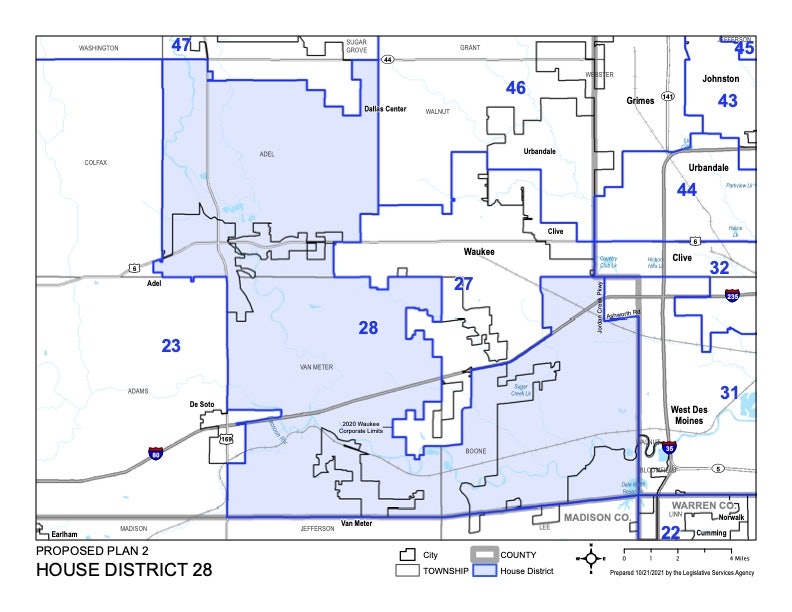
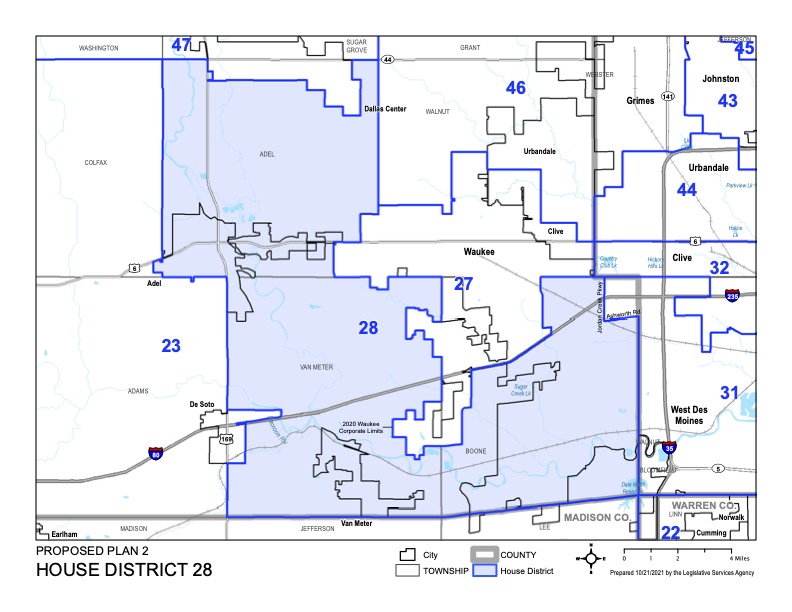
2020 voting for president: Joe Biden 49.0 percent, Donald Trump 48.8 percent
2020 voting for Senate: Joni Ernst 50.9 percent, Theresa Greenfield 46.5 percent
2018 voting for governor: Kim Reynolds 50.2 percent, Fred Hubbell 48.1 percent
Sonya Heitshusen was a longtime television reporter and anchor for a Des Moines-based station and now handles communications for the State Auditor’s office. Tom Walton is general counsel for Delta Dental in Iowa.
Both candidates have written commentaries for this website explaining why they are running for the legislature; Heitshusen’s is here and Walton’s here. The Des Moines Register recently asked both candidates about their policy stances and how they differ from one another.
Heitshusen has reported raising about $40,000 for her campaign, while Walton has raised about $26,000.
The winner on June 7 will face former U.S. Representative David Young, who is unopposed in the GOP primary. I expect heavy spending on this race and a lot of volunteer activity, because the recent voting history shows both parties can compete. Also relevant: House district 28 comprises half of what should be one of the hottest Iowa Senate races of 2022: the clash of incumbents Jake Chapman and Sarah Trone Garriott in Senate district 14.
UPDATE: Heitshusen won with 1,346 votes (71.8 percent) to 528 votes (28.2 percent), according to unofficial returns.
House district 30
Without question, the most contentious Iowa Democratic legislative primary is happening on the south side of Des Moines. Long-serving State Representative Bruce Hunter opted not to seek re-election.
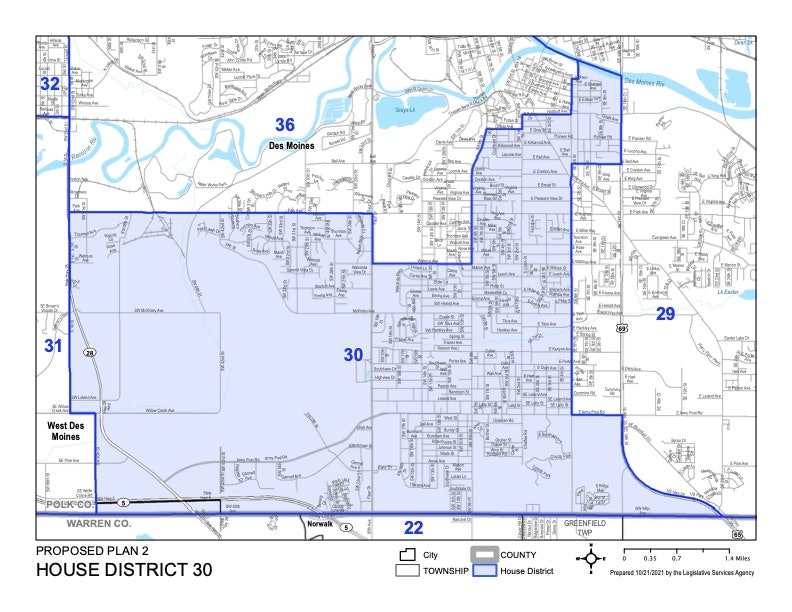
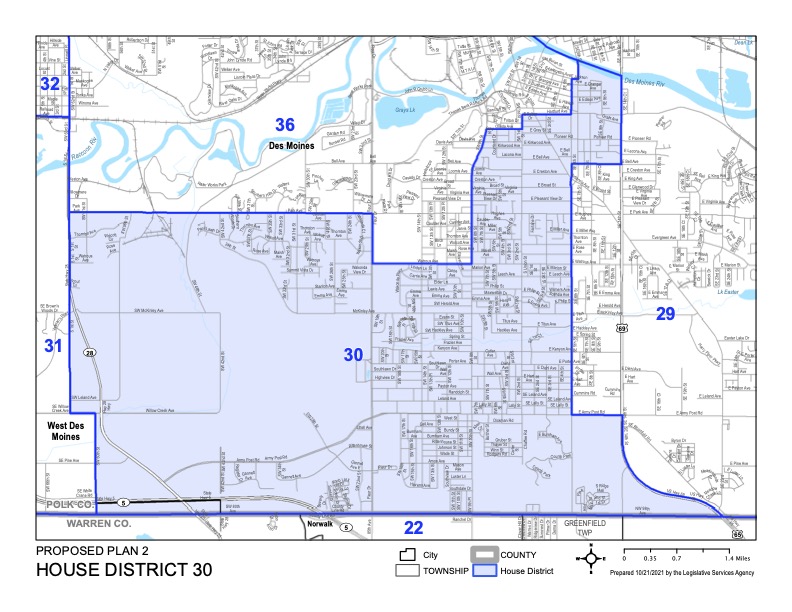
2020 voting for president: Joe Biden 59.5 percent, Donald Trump 38.3 percent
2020 voting for Senate: Theresa Greenfield 60.2 percent, Joni Ernst 36.0 percent
2018 voting for governor: Fred Hubbell 63.5 percent, Kim Reynolds 34.1 percent
Dr. Megan Srinivas was first to launch her campaign here. (She previously ran for the Iowa House district that includes Fort Dodge in 2018.) Numerous current or former elected officials, including outgoing State Representative Hunter, are publicly backing her campaign. The Iowa Federation of Labor AFL-CIO and at least half a dozen union locals have endorsed Srinivas as well, along with organizations such as the Iowa Medical Society, Our Revolution, the Iowa Democratic Party’s Progressive Caucus, and the Iowa Unity Coalition.
If elected, Srinivas would be the second Asian American woman to serve in the Iowa House (Swati Dandekar was the first) and Iowa’s only Hindu lawmaker. The Indo-American PAC of Iowa and National Indian American Impact Fund are supporting her campaign.
Eddie Mauro is making his fourth bid for elective office. The owner of a small insurance business unsuccessfully sought the Democratic nominations for an Iowa House seat in 2016, a U.S. House district in 2018, and for U.S. Senate in 2020. His endorsers include lots of well-known Des Moines residents and two union locals.
Mauro’s first television commercial rubbed many Democrats the wrong way. Its tag line was “South Side pride,” and it emphasized the candidate’s long connection to the area.
My transcript:
Candidate’s voice: I’m Eddie Mauro. I grew up here in the south side. My first job was at Scorno’s [Scornovacca’s, a well-known Italian restaurant].
We raised our kids here. I’ve taught and coached here. I own a small business, volunteer and attend church, right here.
Female voice-over: A product of the south side, Eddie Mauro knows what matters: quality education, good-paying jobs, and a commitment to improving our neighborhoods.
Mauro’s voice: I understand our community. That’s south side pride, and that’s what I’ll fight for in the Iowa House.
The unspoken subtext, to many, was that Mauro’s opponent doesn’t belong here, and those who didn’t grow up on the south side aren’t really part of the community.
Mauro’s campaign is now running a second television commercial. This negative spot highlights the fact that Srinivas used to be a registered Republican. (She changed her voter registration in order to attend an Iowa GOP precinct caucus in 2012 and did not change it back until a few years later.) The new spot falsely claims Srinivas was still a Republican when Governor Kim Reynolds cut education funding and enacted other damaging policies.
Adding to the outrage for many area Democrats, over Memorial Day weekend, one of Mauro’s supporters, political consultant Mark Langgin, posted a copy of Srinivas’ 2012 voter registration form on Twitter, with some of her personal information visible.
Langgin also asserted that Srinivas didn’t live in the district, saying he had visited her apartment building and saw a lease notice taped to the door. He has since deleted his Twitter account but told Bleeding Heartland via email, “I firmly believe voters knowing the vote history, registration information, and residency of candidates for public office is a foundation of representative democracy.”
The controversial tweets prompted an extraordinary news release on June 1, in which the Iowa Federation of Labor AFL-CIO, the Iowa Unity Coalition, the Iowa Democratic Party Black Caucus, Latino Caucus, API Caucus, Progressive Caucus, Labor Caucus, Veterans’ Caucus, and Disability Caucus denounced the “doxxing” and called on Mauro to suspend his campaign.
“I will always tell you the truth,” Srinivas promised in a campaign video released last week.
Srinivas has a television commercial running on Des Moines-based stations; the biographical spot is a lightly edited version of an ad filmed for her 2018 Iowa House campaign.
Both candidates are well-funded. Srinivas has reported raising more than $121,000 this election cycle and had $49,000 in loans from her father to her previous campaign forgiven. Mauro reported a $25,000 contribution from himself in December and loaned his campaign another $75,000 last month. He has also raised more than $55,000 from other individual donors.
Republican Jerry Cheevers is on the ballot in House district 30 but has very little chance in November. The winner on June 7 will almost certainly take Hunter’s place in the Iowa House.
UPDATE: Srinivas won with 1,782 votes (63.5 percent) to 1,025 votes (36.5 percent), according to unofficial returns.
House district 31
This seat, covering part of West Des Moines in Polk County, is open because two-term State Representative Kristin Sunde opted not to seek re-election.
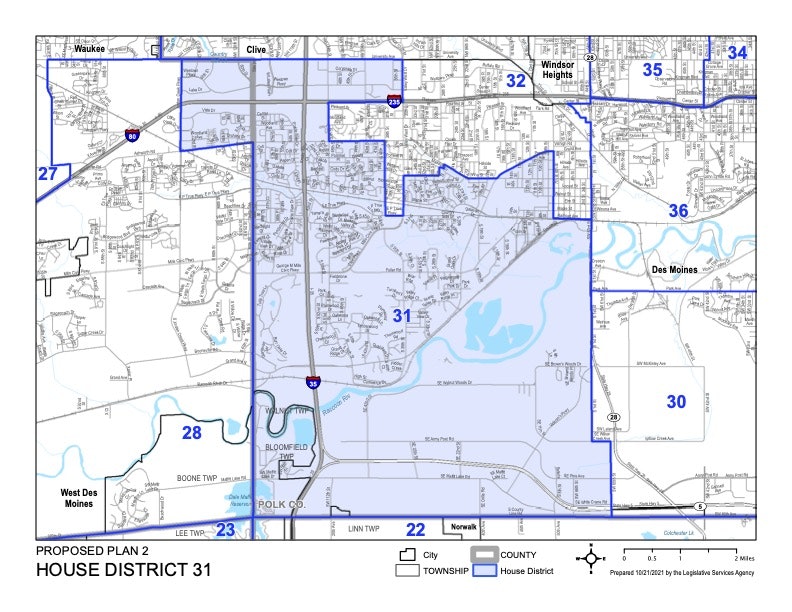
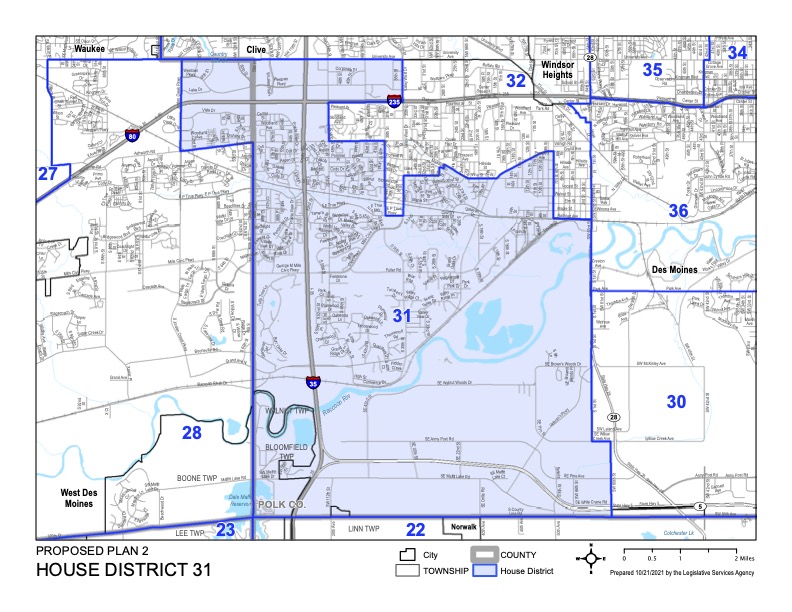
2020 voting for president: Joe Biden 57.9 percent, Donald Trump 40.2 percent
2020 voting for Senate: Theresa Greenfield 55.0 percent, Joni Ernst 43.0 percent
2018 voting for governor: Fred Hubbell 55.6 percent, Kim Reynolds 42.8 percent
This campaign has been a low-key affair. The two Democrats seeking the nomination are both first-time candidates for office. They launched their campaigns relatively late and have kept their messages positive. Michael Andreski is a pharmacy professor at Drake University, and Mary Madison is a minister. The Des Moines Register asked the candidates about their backgrounds and priorities and published their responses here. Andreski wrote this Bleeding Heartland post about why he’s running.
Both candidates have relied more on canvassing and volunteer activity than any paid messaging. Madison’s campaign has reported around $6,000 in contributions, and Andreski has brought in roughly the same amount (of which $3,683 were loans from the candidate).
Madison could become the first Black woman elected to the legislature from a suburb of Des Moines.
Like many suburbs that once favored Republicans, West Des Moines has trended blue in recent years. I wouldn’t say Republican candidate Justin Pearson has no shot in November; as a real estate agent, he has many local contacts. But even in a difficult midterm year, the Democratic nominee in House district 31 will be favored in the general election.
UPDATE: Madison won with 1,513 votes (62.8 percent) to 896 votes (37.2 percent), according to unofficial returns.
House district 36
This open seat, where longtime State Representative Jo Oldson is retiring, has the most crowded Democratic field in the state.
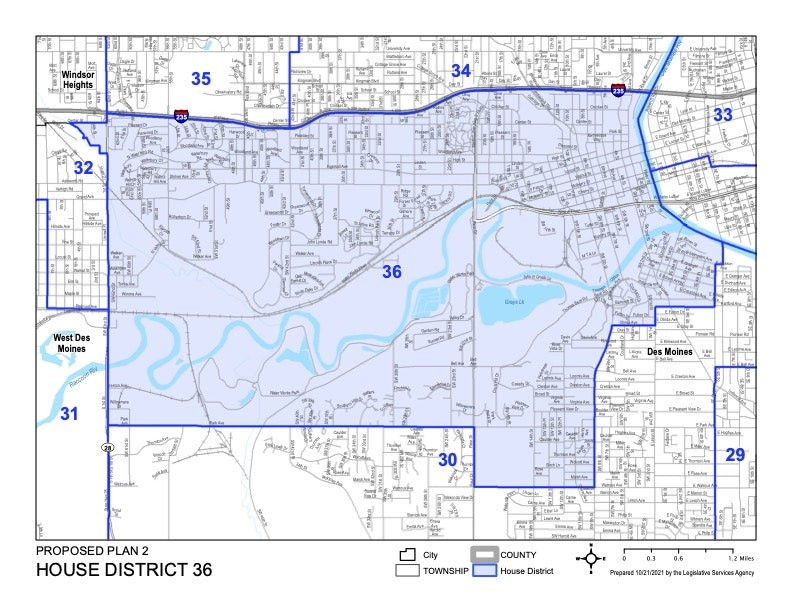
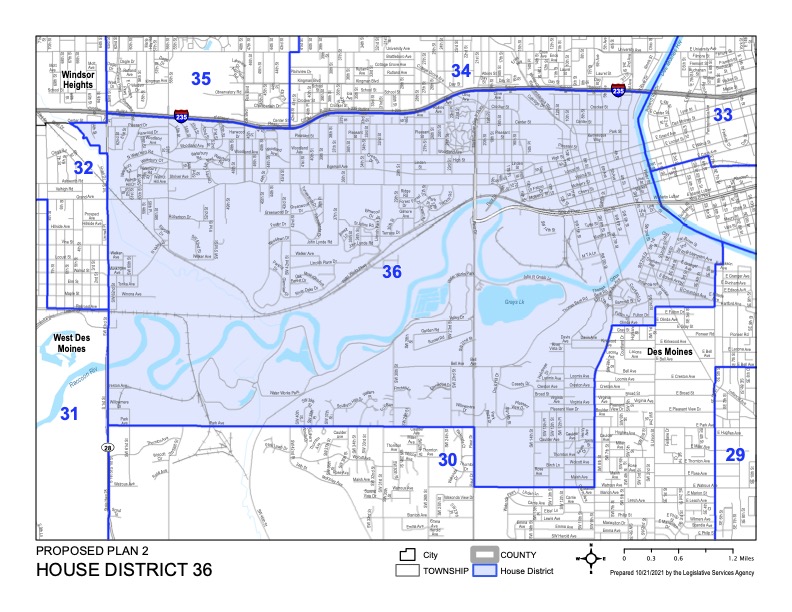
2020 voting for president: Joe Biden 75.0 percent, Donald Trump 22.8 percent
2020 voting for Senate: Theresa Greenfield 73.5 percent, Joni Ernst 24.0 percent
2018 voting for governor: Fred Hubbell 76.1 percent, Kim Reynolds 22.0 percent
The six candidates here, in alphabetical order, are Dr. Austin Baeth, Des Moines Black Liberation Movement organizer Jaylen Cavil, social worker and labor activist Gabe De La Cerda, Iowa Hemp Association founder Chris Disbro, attorney Shannon Henson, and former Des Moines city council member Jack Porter.
I’ll be surprised if any candidate wins the nomination outright on Tuesday. In all likelihood, no one will reach the 35 percent threshold. If that happens, a district nominating convention will select the general election candidate. Delegates (who were chosen from the various precincts at the February 2022 caucuses) could choose anyone and would not necessarily favor the candidate who won a plurality of votes on June 7.
Several candidates could make the House Democratic caucus more representative of Iowa. De La Cerda would be the first Latino Democrat and only the second Latino ever elected to the legislature. He has also noted that he is the only candidate in the field who has worked on a factory floor. Cavil is the only Black candidate in this field and has support from three of the five current Black Iowa legislators. Henson is the only woman in the field.
The candidates agree on many issues, such as reproductive rights or funding public education. The Des Moines Register published their responses to a questionnaire here. Cavil is campaigning as a Democrat who’s not afraid to “talk about things that other people are not talking about,” like defunding local police and the Iowa State Patrol.
While every candidate has some well-known individual supporters, a few have interest group endorsements as well. Cavil’s supporters include Iowa CCI Action, Sunrise Movement Iowa, Our Revolution Iowa, Run for Something, and the Iowa Democratic Party’s Progressive Caucus. The Iowa Federation of Labor AFL-CIO has endorsed De La Cerda. The Iowa Unity Coalition, Vote Pro Choice, and Justice for All PAC are backing Henson.
Henson leads the field in fundraising, with about $54,000 in contributions, plus $10,000 in loans from the candidate. Baeth has raised about $59,000, including $7,000 donated by the candidate. Cavil has reported around $19,000 in contributions. De La Cerda has raised a little less than $10,000, about a third of that coming from the candidate. Porter has given his own campaign around $5,500 and raised just under $2,000 from other donors. Disbro has raised a little more than $2,000.
No Republican has filed for this seat. Whether the GOP nominates a candidate later is immaterial; the Democratic nominee will win in November.
UPDATE: Baeth won the nomination outright with 2,527 votes (49.4 percent), according to unofficial returns. Cavil finished second with 21.1 percent, Henson third with 17.3 percent, and the others were in single digits.
House district 43
This is the only Republican-held seat among the races discussed in this post. The district includes the Des Moines suburb of Johnston and a few neighborhoods in the city of Des Moines.
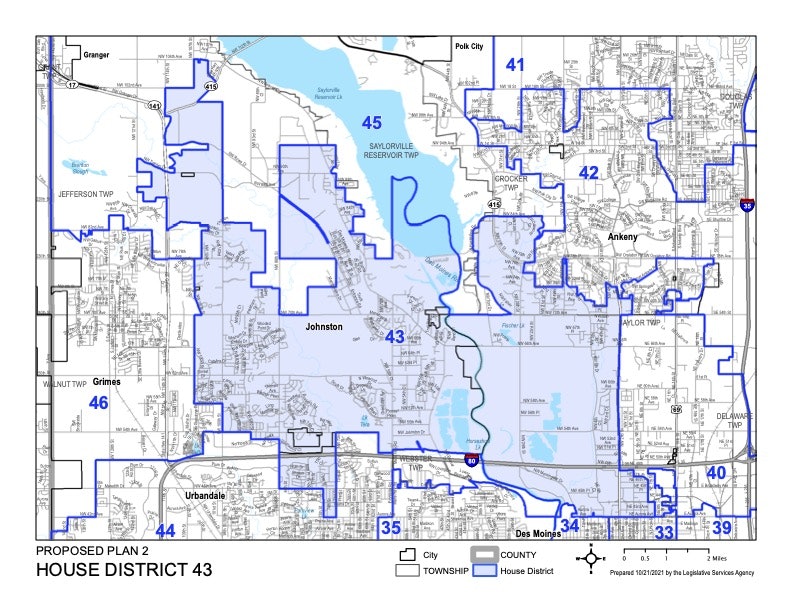
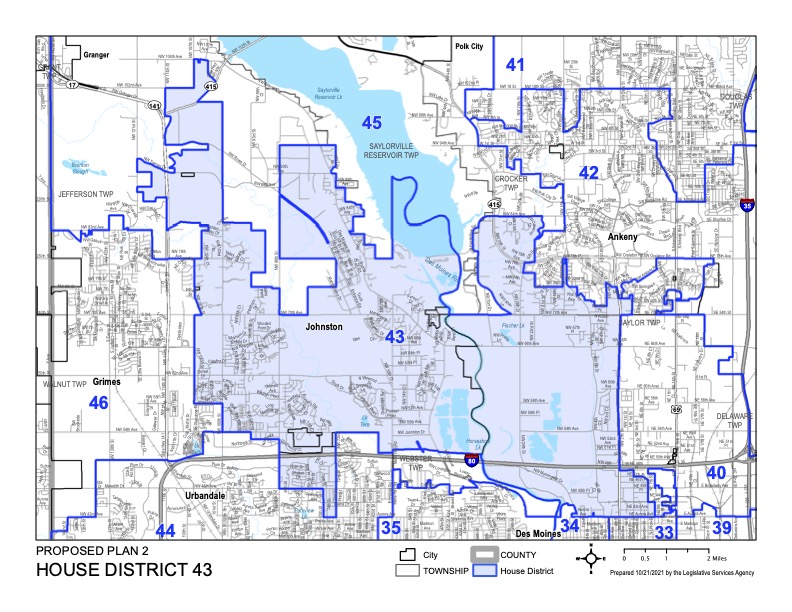
2020 voting for president: Joe Biden 51.4 percent, Donald Trump 46.6 percent
2020 voting for Senate: Theresa Greenfield 49.4 percent, Joni Ernst 48.5 percent
2018 voting for governor: Fred Hubbell 49.3 percent, Kim Reynolds 49.2 percent
Johnston City Council member Suresh Reddy was the first Democrat to begin campaigning here. Community activist and 2021 school board candidate Tiara Mays joined the field later. The Des Moines Register published the candidates’ responses to their issue questionnaire here.
Reddy leads in fundraising. He’s reported about $40,000 in contributions, of which around $11,000 came from the candidate and a bit more than $11,000 from his small business. He also has received two $500 PAC contributions, from the Iowa Unity Coalition and the South Central Iowa Federation of Labor AFL-CIO. Mays has loaned her campaign $3,500 and reported about $4,700 in other contributions, plus more than $8,200 donated in kind.
Both Democrats would enhance the legislature’s diversity. Mays is Black, and Reddy would be the third Asian American ever elected to the state House.
The Democratic nominee will most likely face Republican State Representative Eddie Andrews. (His GOP primary challenger is a perennial candidate, with around a dozen past attempts to run for the legislature.) Andrews is the only Black Republican now serving in the Iowa legislature and just the second Black Republican ever elected to the state House.
House district 43 should be competitive in November. Andrews defeated Democratic incumbent Karin Derry in 2020 by a narrow margin, but he did not carry the Johnston precincts. (The old version of this district also included Grimes, which delivered Andrews’ winning margin.) The new map creates a slightly more favorable district for Democrats. On the other hand, Republicans may benefit from the overall political atmosphere in this midterm.
UPDATE: Reddy won with 1,358 votes (56.6 percent) to 1,041 votes (43.4 percent), according to unofficial returns.
House district 89
Iowa’s bluest state House district covers part of Iowa City and the small community of University Heights. Long-serving State Representative Mary Mascher opted not to seek re-election.
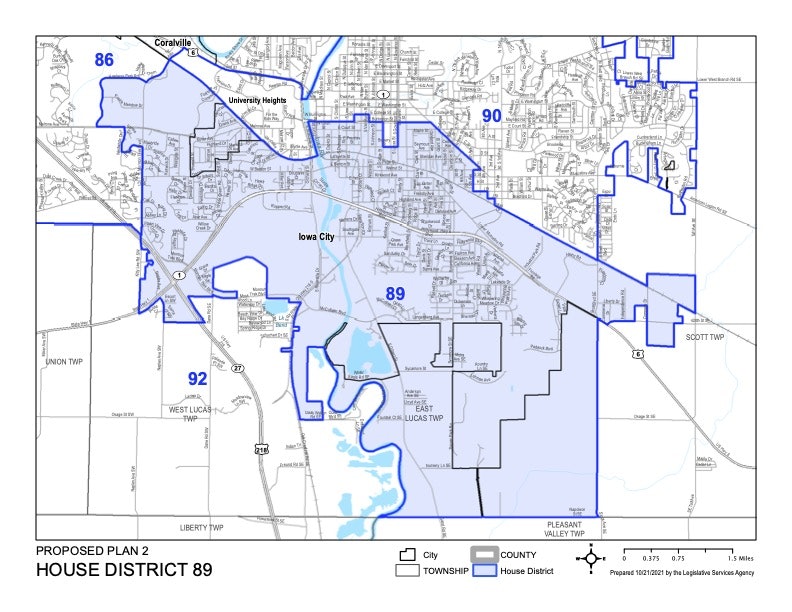
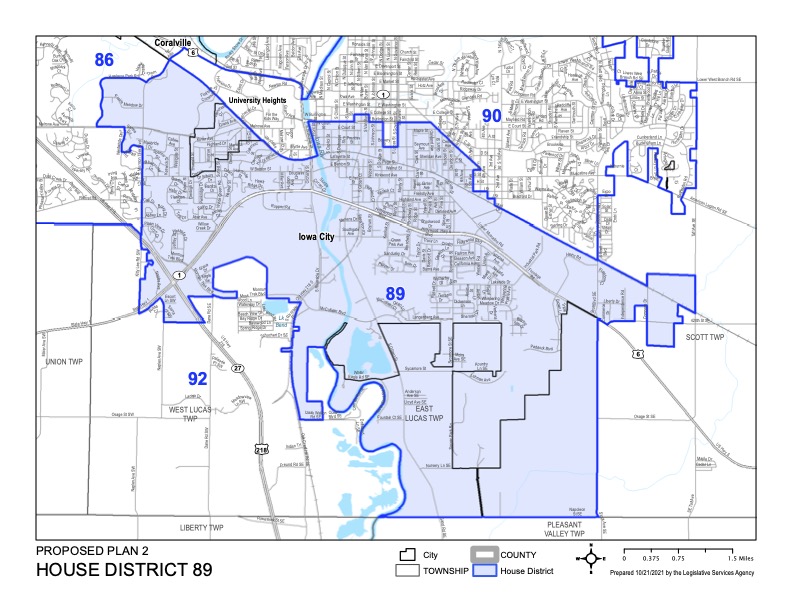
2020 voting for president: Joe Biden 79.1 percent, Donald Trump 18.6 percent
2020 voting for Senate: Theresa Greenfield 77.8 percent, Joni Ernst 19.9 percent
2018 voting for governor: Fred Hubbell 80.4 percent, Kim Reynolds 17.6 percent
Tony Currin is a longtime labor activist and Democratic campaign volunteer in Iowa City. Elinor Levin is a tutor who has called herself an “advocate for compassion and reason.” (A third Democratic candidate declared late last year but dropped out of the race without filing nominating papers.) Run for Something has endorsed Levin, who is also a Moms Demand Action “Gun Sense” candidate. Currin has a strong base of support in labor circles, including the Iowa Federation of Labor AFL-CIO.
The Cedar Rapids Gazette recently profiled this race and found the candidates differed more in style than in their stances on any issues. Levin has promised to spend a lot of time listening to Iowans if elected, whereas Currin has said, “I’m going to be loud. If that Legislature has Democrats still in the minority, I’m going to be a damn loud minority. I won’t be quiet.”
This campaign will be won on the ground, not through big spending. Levin has donated $1,000 to her own campaign and raised about $12,000 from other contributors. Currin has raised about $14,500, including a total of $2,500 from four labor PACs.
Both Democrats identify as part of the LGBTQ community and would make the legislature more diverse in other ways. Currin is Black, and Levin is Jewish.
There is currently no GOP candidate on the ballot in House district 89, because Jacob Onken inadvertently filed nominating papers with the wrong district number. Local Republicans plan to nominate Onken at a special convention this summer, but he won’t be a factor in the general election.
UPDATE: Levin won with 1,692 votes (63.2 percent) to 987 votes (36.8 percent), according to unofficial returns.
House district 90
This seat covers the rest of Iowa City and is open because first-term State Representative Christina Bohannan is running for Congress instead of for re-election.
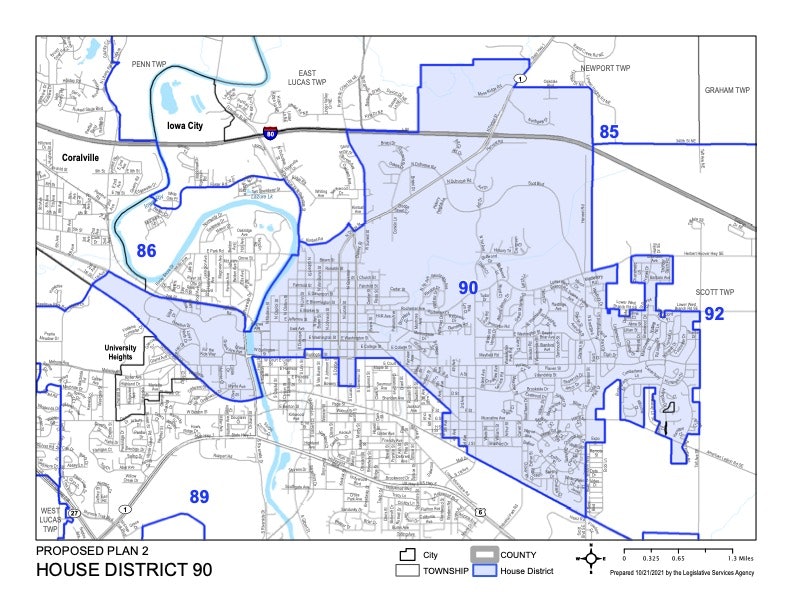
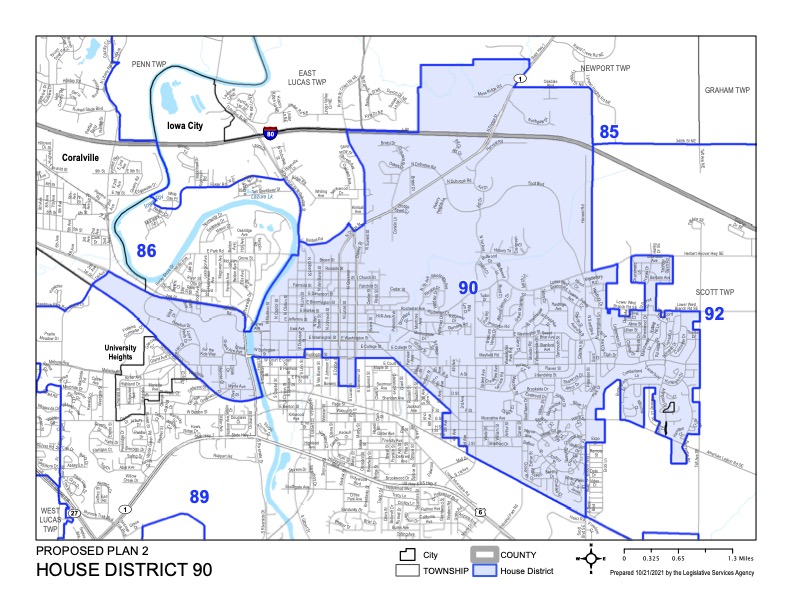
2020 voting for president: Joe Biden 78.9 percent, Donald Trump 19.2 percent
2020 voting for Senate: Theresa Greenfield 77.6 percent, Joni Ernst 20.6 percent
2018 voting for governor: Fred Hubbell 78.8 percent, Kim Reynolds 19.5 percent
It’s a three-way Democratic race in Iowa’s second bluest House district. Two candidates are students in their early 20s: Andrew Dunn and Adam Zabner. Zabner grew up in Iowa City, while Dunn moved to the area more recently. Christy Wolfe joined the race relatively late. She is a longtime Iowa City resident and has been a professor of education at Coe College. She is the sister of retiring State Representative Mary Wolfe, for whom she has clerked. (Dunn has clerked for State Senator Claire Celsi.)
Many well-known local officials and activists, along with a few current or former state legislators, are supporting Dunn and Zabner, respectively.
As for interest group support, Run for Something, the Sunrise Movement, Iowa Democratic Party Progressive Caucus, and Daily Iowan editorial board have endorsed Dunn, as have the Iowa Federation of Labor AFL-CIO and the Ironworkers local. The Iowa Unity Coalition is backing Zabner.
On the fundraising front, Zabner has raised about $37,000, of which a little more than a $1,000 came from relatives. Dunn has raised about $24,000, of which around $4,400 came from the candidate. Wolfe is running a low-budget campaign with $5,265 in reported contributions; family members gave around $1,000 of that amount.
In terms of expanding diversity at the statehouse, Wolfe is a woman. Zabner could become the legislature’s first Latino Democrat and is also Jewish.
At this writing, Republicans are not fielding a candidate in House district 90.
UPDATE: Zabner won with 1,999 votes (42.6 percent) to 1,716 votes (36.6 percent) for Dunn and 972 (20.7 percent) for Wolfe, according to unofficial returns.

